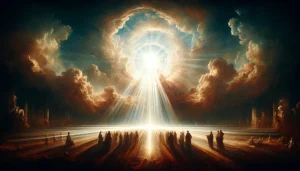
Language
וַיִּקְרָ֧א (and called )קרא implies the act of calling or proclaiming. Here, God’s act of calling the expanse “heaven” is an exercise of His divine authority to define and categorize His creation.- Isaiah 40:26, “Lift up your eyes on high and see: who created these? He who brings out their host by number, calling them all by name; by the greatness of His might and because He is strong in power, not one is missing.”
אֱלֹהִ֛ים (God )אֱלֹהִים (Elohim) is a plural Hebrew word used for the God of Israel as well as other gods or spirits. When referring to the God of Israel, it appears with singular verbs. This “plural majesty” emphasizes God’s greatness.- Leviticus 19:4, “Do not turn to idols or make for yourselves any gods of cast metal: I am the LORD your God.
לָֽרָקִ֖יעַ (to expanse )רָקִיעַ refers to the firmament or expanse, often understood as the sky or heaven. In ancient Near Eastern cosmology, this would be the “dome” separating the waters above from those below.- Psalm 19:1, “The heavens declare the glory of God, and the expanse proclaims his handiwork.”
שָׁמָ֑יִם (heavens )שָׁמָ֑יִם (sha-mayim) and waterמַיִם (mayim) are similar.- Jeremiah 10:13, “When he utters his voice, there is a tumult of
waters in the heavens, and he makes the mist rise from the ends of the earth. He makes lightning for the rain, and he brings forth the wind from his storehouses.”
- Jeremiah 10:13, “When he utters his voice, there is a tumult of
בֹ֖קֶר (morning )בָּקַר is often used to describe not only the time of day but also a period of new beginnings, hope, and deliverance.- Psalm 30:5, “For his anger is but for a moment, and his favor is for a lifetime. Weeping may tarry for the night, but joy comes with the morning.”
י֥וֹם שֵׁנִֽי (second day )שֵׁנִי literally means “second” not “two” (שְׁנַיִם ). The termיוֹם (day) is commonly understood to mean a 24-hour day, although it can also mean a period of time or a specific point in time.- Joshua 6:14, “And the second day they marched around the city once, and returned into the camp. So they did for six days.”
Water and HeavenIn Hebrew, the terms water
מַיִם (mayim) and heavenשָׁמַיִם (sha-mayim) look and sound so similar that it’s tempting to assume they share an etymological relationship. Nevertheless, some scholars suggest that heaven “שָׁמַיִם” (shamayim) is not etymologically connected to waterמַיִם (mayim). Instead, they propose that heavenשָׁמַיִם (sha-mayim) is a dual form of the Hebrew wordשם (sham), meaning “there.” This interpretation is consistent with the idea of “upper and lower waters” as alluded to in the Book of Genesis. Exploring the transition from “mayim” to “shamayim” is akin to embarking on a theological adventure that spans the earthly and the divine. The relationship serves as an allegorical illustration of how God’s presence envelops both the natural and the supernatural, and reflects the Hebrew concept of “Shalom,” a holistic peace that encompasses every aspect of existence.
Insights
“The naming of it: He called the firmament heaven. It is the visible heaven, the pavement of the holy city; above the firmament God is said to have his throne (Ezekiel 1:26), for he has prepared it in the heavens; the heavens therefore are said to rule (Daniel 4:26). Is not God in the height of heaven? (Job 22:12). Yes, he is, and we should be led by the contemplation of the heavens that are in our eye to consider our Father who is in heaven.”
Highlights:
- Naming of the Firmament: Henry emphasizes that the firmament, called “heaven,” is the visible sky that serves as the “pavement of the holy city.”
- God’s Throne: He references Ezekiel 1:26 to point out that God’s throne is said to be above this firmament, reinforcing the concept of heaven as God’s dwelling place.
- Heavens as Rulers: Citing Daniel 4:26, Henry suggests that the heavens “rule,” possibly in the sense of exerting divine influence or order upon the earth.
Matthew Henry: “The height of the heavens should remind us of God’s supremacy and the infinite distance there is between us and him; the brightness of the heavens and their purity should remind us of his glory, and majesty, and perfect holiness; the vastness of the heavens, their encompassing of the earth, and the influence they have upon it, should remind us of his immensity and universal providence.”
Absence of “It Was Good”Notably, the phrase “and God saw that it was good” is missing from the account of the second day, unlike the other days of creation. John Gill offers two possible reasons in his commentary:
- A Jewish interpretation suggesting that the angels fell on this day, although this is deemed less likely.
- A more plausible reason provided by Jarchi, which is that the work concerning the waters was not completed on the second day but was concluded on the third day. This is why the phrase “it was good” appears twice in the account of the third day.
- Genesis 1:10, 12 “…And God saw that it was good.” (Day 3)
- Genesis 1:31, “And God saw everything that he had made, and behold, it was very good.”
John Gill (1697–1771) was an English Baptist pastor, biblical scholar, and theologian. He is best known for his exhaustive commentary on the Bible, which was one of the first to take each verse of the Bible and provide an exegesis, bringing together both linguistic and theological understandings. His work, often referred to as “Gill’s Exposition of the Entire Bible,” remains a significant resource for students and scholars of the Bible.




